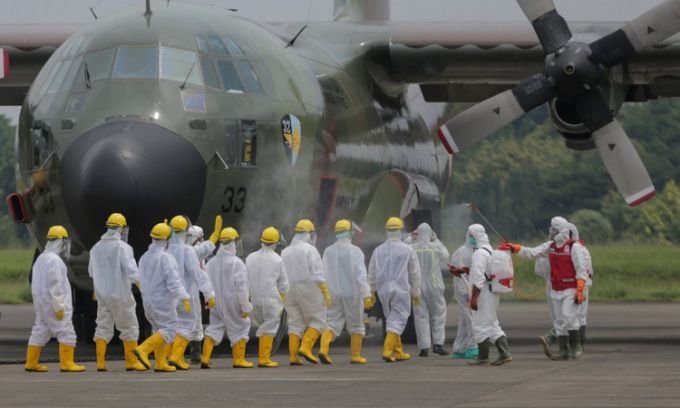
Indonesia – where the death rate from nCoV is alarming
Indonesia recorded the highest number of deaths from Covid-19 in Southeast Asia with 49 deaths out of 579 infected people.
Experts believe that the cause is that the number of positive cases detected is too small, and the death rate will gradually decrease as more people are tested and treated.
Indonesian soldiers prepare to deliver medical equipment at Jakarta airport on March 23.
To date, only a few thousand of Indonesia’s 270 million residents have been tested for nCoV, a rate among the lowest in the world.
However, Indonesia also faces the risk of a Covid-19 outbreak when many patients are missed and there is no drastic response solution.
The Center for Mathematical Modeling of Infectious Diseases (CMMID) based in London, England, believes that the actual number of people infected with nCoV in Indonesia could be between 70,000-250,000, depending on the rate of spread.
`When the first death appeared, it was likely that there were hundreds to thousands of people infected with the disease in the community. This caused many difficulties in efforts to localize and trace people who had come into contact with the patient, forcing
Indonesia announced the first two cases of infection on March 2, amid suspicions that nCoV had spread widely without being detected.
Professor Niall Ferguson of Imperial College London in the UK also shares the same opinion, saying that the growth rate of new infections in Indonesia may skyrocket in the near future.
Jakarta has so far only applied a limited number of measures to prevent the situation from worsening, including an entry ban on people from the world’s most affected countries including China, Italy, Iran and South Korea.
Indonesian President Joko Widodo still rejects the possibility of blockading the capital Jakarta, where most of the country’s positive cases and deaths were discovered.
Indonesia does not apply mandatory quarantine for people entering the country like Singapore and Australia, nor does it issue travel restrictions, although the police are ordered to close crowded religious events, as well as suspend all sports and activities.

Medical staff at the field hospital in the Asiad athletes’ village on March 23.
The Indonesian government has designated 130 hospitals to specialize in treating people with Covid-19, adding 161 police and military hospitals to the reserve list.
President Widodo ordered the preparation of millions of doses of the anti-malaria drug chloroquine and flu medication, even though there is no evidence that they are effective against Covid-19.
`It may take several weeks to know whether these measures are effective or not. In fact, Indonesia is likely to face a Covid-19 tsunami and the health system is at risk of being overwhelmed.
Covid-19 also exposed cracks between the central government and the provinces, and exposed weaknesses in Widodo’s approach to politics and his leadership style.
Joko Widodo has always applied a fixed formula from the time he was a businessman, to the time he became mayor of Solo city, governor of Jakarta and President of Indonesia.
This approach is especially successful when running for office, especially when other politicians show weakness, making Widodo’s small improvements significant.
Jakarta’s initial reaction made many people concerned.

President Widodo (left) and Minister Putrano at a press conference in Jakarta on March 2.
The Indonesian President last week admitted that the government was limiting information about Covid-19 because `it did not want to cause panic` among the public.
Widodo tried to reassure people, encouraging them to apply basic anti-epidemic measures such as constantly washing hands and limiting social contact.
Indonesia has long faced disagreements between ministries, as well as between central and local governments.
`Widodo’s political style is not enough to resolve a crisis of this scale. One of the reasons why local governments are applying their own responses is that they are losing confidence in their management capacity.


